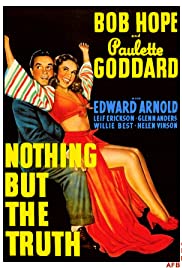
NOTHING BUT THE TRUTH
US, 1941, 90 minutes, Black-and-white.
Bob Hope, Paulette Goddard, Edward Arnold, Leif Erikson, Helen Vincent, Willie Best, Glenn Anders, Grant Mitchell, Rose Hobart, Clarence Kolb.
Directed by Elliot Nugent.
This is a Bob Hope comedy from early in his film career. It was made at the time he was appearing with Bing Crosby in the early Road films. His co-star is Paulette Goddard with whom he had appeared in The Cat and the Canary as well as The Ghost Breakers.
This film is based on a play, relying for its impact on dialogue as well as comic situations. Bob Hope is slightly more heroic in this one, a man of principle who always tells the truth. There is less of his vanity and cowardly streaks as in other films.
This is the world of big business and frauds, especially embodied by Edward Arnold, who had done this was to do this in many times. Leif Erikson is in love with his niece. Glenn Anders is married to the boss’s daughter but is flirting (or more) with an actress from New York City. Bob Hope’s Steve Bennett is invited into the company, hoping that he will invest, as well as his clients, in a fraudulent mine in New Mexico.
However, the main thrust of the film is a bet that that the three make with Steve, that he will tell the truth for 24 hours. Steve invests charity money entrusted to him by the boss’s niece in the bet, Gwen, Paulette Goddard, who is being pursued for the cash by the charity boss.
Most of the action takes place on the rich man’s yacht, well-to-do people at dinner, the three men tantalising Steve, asking all kinds of questions. There are extraordinary number of mixups, misinterpretations, wrong cabins, stealing clothes and having to wear a female dressing gown… But, of course, all is well at the end.
Of interest is the presence of Willie Best, an African- American character actor, given some stereotypical situations but also given a more substantial character, friend of Bob Hope, looked down on by the wealthy, but appreciated by hope and Paulette Goddard (with whom he had appeared in other films).
1. Bob Hope comedy of the early 1940s? At the beginning of his comic screen career?
2. The Florida setting, business and offices, theatre, the yacht? The musical score?
3. The business atmosphere, TT Ralston and his schemes, the quicksilver mine, easy money, getting Steve Bennett and his clients, his son-in-law, and Van Dusen wanting to marry his niece? Avoiding his niece and her charity collections? Edward Arnold and his doing this role so often?
4. Steve Bennett, working with Samuel, Willie Best as a screen performer, part of the stereotype of the past, yet a substantial character, looked down on by the business people, working as partner with Steve, Gwen and her pleasant interactions? Issues of racial African- American stereotypes on screen? Samuel and his work, conversations with Steve, the luggage, the pictures, the fishing…?
5. Steve and his telling the truth, the three challenging him, the bet? Gwen approaching him, the $10,000, safe keeping, investment? Steve taking on the bet? The avaricious attitude of the others? Their testing him, all the questions? His going to the yacht? The meal and his having to tell the truth, insulting the hostess?
6. The comedy of the telling of the truth, subterfuges, the further complication with Gwen, with the actress from New York, as his wife, the older ladies trying to reconcile the couple…?
7. The psychiatrist at the dinner, Steve and the dress for the play, their taking his clothes, putting on the dressing down, the psychiatrist observing, his analysis, suggesting sessions?
8. The newspaperman, Steve telling the truth about his editorials, his wanting to get the scoop?
9. Mr Bishop, the charities, wanting the money, deadline, arriving at the yacht, his demands, Steve putting him off?
10. Dick Donnelly, his father-in-law, cheating on his wife, the actress?
11. Van Dusen, snobbish, attitude towards Gwen, hopes?
12. The film based on a play, heavy on dialogue rather than action, and the pleasure of listening to comic verbal dialogue as well as seeing the situations?